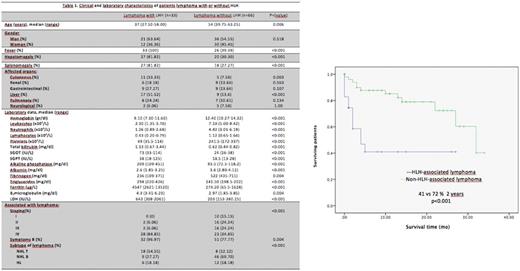Abstract
Introduction :
Hemophagocytic lymphohistiocytosis (HLH) is frequently associated with malignancies, specifically with lymphoma. It is an heterogeneous and life-threatening disease. HLH is associated with aggressive lymphomas and a worse outcome (1). There is no consensus about the optimal treatment in this group of patients (2). This study compares the characteristics and outcomes of patients with HLH-associated lymphoma to non-HLH-associated lymphoma; and assess the impact of HLH on the survival of patients with lymphoma.
Patients and methods :
We included 33 adults (age ≥18 years) from 1998 to 2016, with HLH-associated lymphoma. HLH was diagnosed with 5/8 HLH-04 diagnostic criteria and for lymphomas we used the WHO 2008 classification. to determine if there were differences between lymphoma with or without HLH, a control group of patients diagnosed in the same time period with non-HLH-associated lymphoma (n = 66) was randomly selected. To assess the impact of HLH on overall survival (OS), another matched control group was selected by clinical stage, type of lymphoma and the same chemotherapy regimen (n = 33).
Results:
The patients with HLH-associated lymphoma were younger (37 vs 54 years, p=0.006). Among the clinical characteristics and laboratory abnormalities, patients with HLH-associated lymphoma presented more frequently with higher fever (100 vs 39.39% p <0.001), hepatomegaly (81.82 vs 30.30%, p <0.001), splenomegaly (81.82 vs 27.27% p <0.001), advanced clinical stages III / IV (90.91 vs 59.09%, p <0.001), B symptoms (96.97 vs 77.77%, p=0.004), cutaneous involvement (33.33 vs 7.58%, p = 0.003), liver disease (51.52 vs. 13.6%, p <0.001), higher ferritin levels (4547 vs 274 ug / L, p <0.001) and more lymphopenia (0.43 vs 1.12x109 / L, p=0.001) (table 1). Patients with HLH-associated lymphoma had a worse 2 year-OS (41 vs. 87.4%, p<0.001). The most common type of HLH-associated lymphoma was T-cell non-Hodgkin's lymphoma (NHL) (54.55%) followed by B-cell NHL (27.27%) and Hodgkin's lymphoma (HL) (18.18%). When comparing patients with non-HLH-associated lymphoma matched by clinical stage, lymphoma type, and treatment with patients with HLH-associated lymphoma, the OS at 2-year was lower in the latter group (41 vs 65%, p = 0.038) figure 1. We analyze by lymphoma subtype, and the presence of HLH had only a significant impact in the T cell NHL survival (2 year-OS of 28.8 vs 55.9%, p = 0.011).
Conclusion :
HLH is associated with advanced lymphomas in young patients. Our results showed that HLH impacts on the OS in patients with T-cell NHL, but we found no significant different outcomes in patients with B-cell NHL and HL with the presence of HLH. Prospective studies are needed to confirm this results.
Bibliography:
1.-Parikh SA, Kapoor P. Prognostic factors and outcomes of adults with hemophagocytic lymphohistiocytosis. Mayo Clin Proc. 2014;89(4): 484-492.
2.-Daver N, McClain K. A consensus review on malignancy-associated hemophagocytic lymphohistiocytosis in adults. Cancer. 2017;00(0):1-12.
No relevant conflicts of interest to declare.
Author notes
Asterisk with author names denotes non-ASH members.


This feature is available to Subscribers Only
Sign In or Create an Account Close Modal